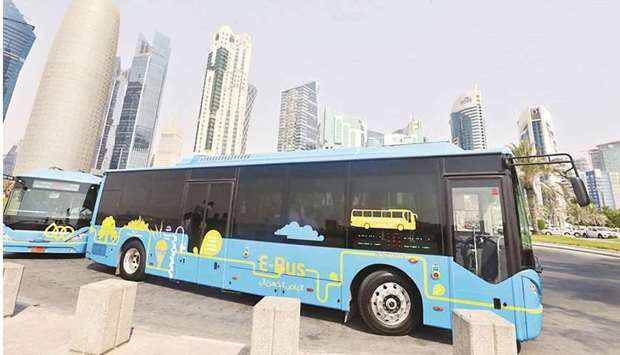The Qatar Free Zones will see production of 1,500 electric buses within seven years from the end of 2022, Mowasalat (Karwa) CEO Fahad Saad al-Qahtani has said.
"The production shall be increased according to the market demand and the buses will also be exported to the Middle East, Europe, South America and Africa," he told local Arabic daily Arrayah.
“In the first phase, we are preparing the framework of the project while the second phase includes design works. During the final phase by the end of 2022, production will be started,” al-Qahtani explained.
Last year, Qatar Free Zones Authority (QFZA) signed a multilateral framework agreement with Yutong, one of the world's largest bus and coach suppliers and Mowasalat to manufacture electric buses in the Free Zones. The deal is part of a wider Qatari initiative to ensure 25% of the public bus network is powered by electricity during FIFA 2022 World Cup with the entire public fleet system expected to be e-powered by 2030. The deal will also see technology and knowledge transfers so that parts for the e-buses will be manufactured by Qatari firms as part of the government’s wider localisation drive. These firms are expected to form the foundation of the region’s leading e-vehicle industry, supplying e-vehicles and parts to markets across the globe.
Al-Qahtani said Qatar will purchase buses to be be operated during the World Cup. Agreements are already in place with Yutong for 741 electric buses and 261 diesel buses, and with Higer to purchase 1,815 buses powered by the new eco-friendly diesel.
The official pointed out that efforts are on to set up bus charging stations in various parts of the country in co-operation with the Public Works Authority. Karwa will provide operational services for such buses and their facilities, in addition to providing the smart technology and techniques to manage the fleet. This is in addition to ensuring all safety and security requirements, essential transportation plans and necessary consultation services.
“In the first phase, we are preparing the framework of the project while the second phase includes design works. During the final phase by the end of 2022, production will be started,” al-Qahtani explained.
Last year, Qatar Free Zones Authority (QFZA) signed a multilateral framework agreement with Yutong, one of the world's largest bus and coach suppliers and Mowasalat to manufacture electric buses in the Free Zones. The deal is part of a wider Qatari initiative to ensure 25% of the public bus network is powered by electricity during FIFA 2022 World Cup with the entire public fleet system expected to be e-powered by 2030. The deal will also see technology and knowledge transfers so that parts for the e-buses will be manufactured by Qatari firms as part of the government’s wider localisation drive. These firms are expected to form the foundation of the region’s leading e-vehicle industry, supplying e-vehicles and parts to markets across the globe.
Al-Qahtani said Qatar will purchase buses to be be operated during the World Cup. Agreements are already in place with Yutong for 741 electric buses and 261 diesel buses, and with Higer to purchase 1,815 buses powered by the new eco-friendly diesel.
The official pointed out that efforts are on to set up bus charging stations in various parts of the country in co-operation with the Public Works Authority. Karwa will provide operational services for such buses and their facilities, in addition to providing the smart technology and techniques to manage the fleet. This is in addition to ensuring all safety and security requirements, essential transportation plans and necessary consultation services.

